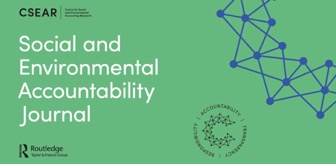

Oana Apostol, Colin Dey & Ian Thomson
SEAJ’s tradition of constructive challenge, informed commentary, provocation and drawing attention to emerging ‘external’ events lies at the heart of the first issue of 2024. We feel privileged to have had the opportunity to curate a collection of polemic essays that comment, reflect on and critique recent events and developments of problematic nature. Collectively, the authors report on their reflections and concerns, with the purpose to stimulate reflection, dialogue and action. This issue has been curated in a way to give voice to scholars located in different parts of the planet, in the spirit of informing the transformative potential of meaningful social and environmental accountability research. These contributions provide a fascinating insight into the ongoing state of our discipline, as well as its engagement with broader efforts to bring about sustainable transformation, including consideration of a global Southern perspective.
Our issue begins with a fascinating piece by Yves Gendron (2024) that explores the tensions arising from the American Accounting Association (AAA)’s decision to host a sustainability accounting conference at a Middle Eastern oil & gas university. Highlighting the potential conflicts of interest involved, Gendron cleverly adopts precisely the same kind of instrumental signalling logic normally favoured by mainstream accounting scholars to argue that the AAA’s decision sends out an ‘awkward signal’ that seems difficult to justify.
Daniela Senkl (2024) responds to the questions raised by Gendron by seeking to further open out these issues from pluralist agonistic and feminist perspectives. Senkl argues that unless it can provide space for authentic dialogue, mainstream accounting’s view of sustainability is symptomatic of a continuing identification with an ‘extractive mindset’ that is applied not only to hydrocarbons but to people and ideas.
In the third contribution to this issue, Manuel Castelo Branco (2024) explores the emergence of literature reviews in the ‘new wave’ of North American CSR-related research. Drawing on notions of performativity, Branco argues that these reviews have further reinforced the self-referential tendencies within this academic community and concludes that such trends exacerbate the already incomplete and misleading state of this body of literature.
Finally, Arielle Lee, Charika Channuntapipat, and Robert Charnock (2024) offer a fascinating insight into climate negotiations at the recent COP28 conference in Dubai. The commentary highlights the intricate problematics at play for climate justice to be considerate of issues related to the global scale of climate frameworks and poses some provocative questions, which we hope will serve as a starting point for interesting research projects.
The reviews section contains another excellent mix of commentaries on a range of subjects including artificial intelligence, climate finance and risk. We thank the contributors and SEAJ’s great reviews editors team of Nicolas Garcia-Torea, Erin Twyford and Xinwu He.
We hope you will enjoy this issue and find inspiration in the passionate engagement of its contributors with matters of interest for us and society.
